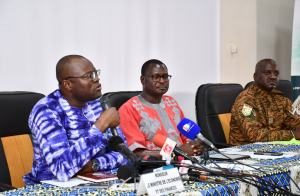Burkina Faso: Creation of the Burkinabe Atomic Energy Agency (ABEA), a further step towards the creation of a nuclear industry

The establishment of the Burkinabe Atomic Energy Agency (ABEA), announced on Wednesday, August 14, 2024, by the government during the Council of Ministers, marks a pivotal moment in President Ibrahim Traoré’s bold plan to equip Burkina Faso with a nuclear power plant.
This groundbreaking initiative, in partnership with the Russian State Atomic Energy Corporation (ROSATOM), is set to revolutionize the country’s energy landscape and pave the way for a more self-sufficient and prosperous future.
President Traoré’s vision, first outlined in 2023, demonstrates a strong commitment to reducing Burkina Faso’s reliance on external energy sources—an essential factor for the nation’s economic and industrial growth.
By leveraging Russia’s expertise in nuclear technology, Burkina Faso is taking significant strides towards accelerated industrialization, with nuclear energy poised to play a central role.
The formation of the ABEA underscores this commitment, providing the nation with a strategic body to manage and advance its nuclear energy program.
The nuclear project extends beyond achieving energy independence; it opens up vast opportunities for Burkina Faso.
Reliable and sustainable energy can not only drive the country’s industrialization but also bolster critical sectors such as scientific research and healthcare.
The applications of nuclear energy in these areas are numerous, from producing isotopes for medical treatments to enhancing agricultural irrigation techniques.
Acknowledging this initiative, it is essential to understand that President Traoré’s vision is more than just an energy project—it is a powerful catalyst for Burkina Faso’s overall development.
The envisioned nuclear power plant goes beyond meeting energy demands; it symbolizes a pursuit of technological sovereignty and innovation.
By choosing this ambitious path, Burkina Faso is empowering itself to break free from external dependencies and chart a promising course for its future.
This unwavering commitment to making nuclear energy a cornerstone of the national economy deserves recognition.
It reflects a visionary leadership that is not only prepared to face the challenges of a rapidly changing world but also dedicated to securing a better future for the generations to come.
Cédric KABORE












